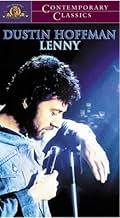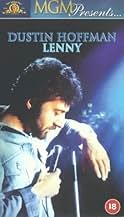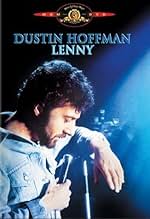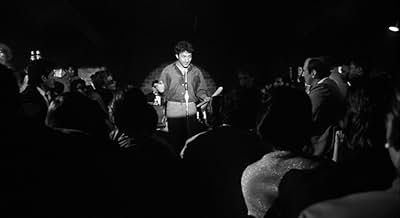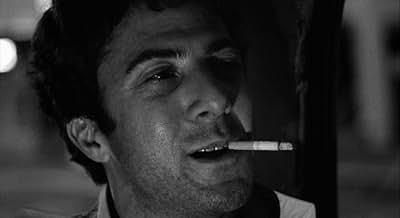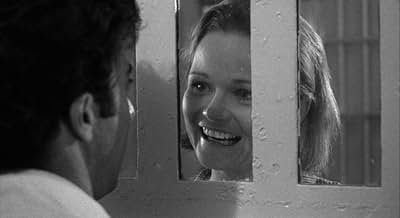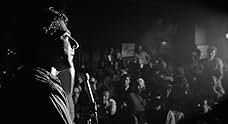Ajouter une intrigue dans votre langueThe story of acerbic 1960s comic Lenny Bruce, whose groundbreaking, no-holds-barred style and social commentary was often deemed by the Establishment as too obscene for the public.The story of acerbic 1960s comic Lenny Bruce, whose groundbreaking, no-holds-barred style and social commentary was often deemed by the Establishment as too obscene for the public.The story of acerbic 1960s comic Lenny Bruce, whose groundbreaking, no-holds-barred style and social commentary was often deemed by the Establishment as too obscene for the public.
- Nommé pour 6 oscars
- 7 victoires et 17 nominations au total
- Girl
- (as Kathie Witt)
- Hawaiian Judge
- (as Monroe Meyers)
Avis en vedette
Made in a fairly familiar quasi-documentary style, 'Lenny' begins with 'present day' (i.e. 1974) interviews with the surviving characters from Lenny's life, cut with flashbacks to his 1950's beginnings as a 'traditional' comic, and 'late' live performances in his post-drug-bust days. As the film progresses and the narrative catches up with the interviews, the gaps between these segments 'close'. Clever use is made of some of Lenny's material, cutting from keywords or phrases in his bits, to events in his life with inspired or correlated to them.
All the same there is something a little dry and disappointing in the film's structure: almost as if it could have used a more conventional, linear narrative, like Milos Forman's tribute to Andy Kauffman, 'Man on the Moon' would use to such great effect 25 years later.
Ironically though, such a structure might have deprived of us of seeing more of Hoffman doing Lenny's bits 'live' on stage - and for me these were the highlights, which I wish had lasted longer, rather than flashing back to some past event after 30 seconds. As a big Lenny Bruce fan, I can only say that Hoffman's portrayal is almost supernatural. It's like he's channeling the guy. He has his mannerisms and improvisational style down perfectly. You would swear you were seeing these improvisations for the first time if you hadn't heard them already. In fact, Hoffman possibly even improves on Lenny's delivery in one small respect. Lenny had a penchant for the 'conversation' that would erupt in the middle of one of his bits, between two or more characters. Hoffman probably puts a bit more distinction between the characters than Lenny often did (quite often they would all just sound like Lenny, which was part of the magic, but never mind.) Over 30 years on, it's quite amazing to me that this film has become a relative obscurity in Dustin Hoffman's filmography. Frankly, though Hoffman has blown me away on various occasions, I don't ever remember being more blown away than this. And if you were to pick easy people to imitate, I doubt Lenny Bruce on stage would be high on many people's lists.
The film as a whole is good, but to witness Hoffman channeling Bruce, it's a must-see.
He was infamously arrested over a dozen or so times for speaking offensively in comedy clubs, and eventually began to represent himself in court. He never gained respect when he was alive, and so he died a frustrated, misunderstood soul who was simply far too ahead of his time.
The masses didn't get him. His racial jokes and political satire was misinterpreted and taken at face value. His sermons ridiculing religion drew hate from conservative Americans.
But Bruce enjoyed toying with words, and bending the typical perception of what they symbolized he cherished the impact they had on people. When Bruce said a certain four-letter expletive, it wasn't to purposely offend people it was to help liberate their ways of thinking. Words were an entryway - once he could knock people off-balance, he was free to go for the throat. He used foul language in the same way as he used words dealing with religion, homosexuals, politics and the world he used them to make a point. And it's a shame his point didn't resonate until after his death.
The makers of "Lenny" understood Bruce, though. They also understood his flaws as a human being, and the result is an unflinchingly honest biopic that paints a dark, staunch portrait of a troubled man. Dustin Hoffman presents Lenny as an alternately despicable and heroic figure, and there is a spark in his eyes throughout the early scenes of the movie that eventually gives way to desperation later in the picture. Hoffman is so convincing we forget we are watching an actor. He entirely embodies himself within Lenny Bruce, adapting all of the comic's tics and habits.
The movie is told from the perspective of those who knew Bruce his wife, Honey (Valerie Perrine), his aunt, and his manager. The narrative cuts back and forth between scenes with Lenny and interview segments, which we see through the eyes of an off-screen interviewer (whose voice is none other than the movie's director, Bob Fosse).
"Lenny" is an uncomfortable film, and it is not by any means perfect. The matter-of-fact narrative is a bit alienating and prevents us from getting entirely close to Bruce but that may very well have been the point. A more heartfelt biography of the performer perhaps would have restricted Fosse and screenwriter Julian Barry from divulging into Lenny's more seedy character traits such as when he coerces his unwilling wife into a threesome with another woman, later ridiculing her for doing so; or when he goes on stage completely drugged out of his mind and makes a fool of himself. If they had allowed audiences to empathize with Bruce to a greater degree, truth may have been sacrificed along the way. And although the narrative is rather cold, it's also unique sometimes refreshingly so.
Despite imperfections, "Lenny" is one of the better motion pictures of the 1970s and perhaps one of the movies that best capture the essence of cinema from a time when the mainstream and art-house were coexistent.
It is a typical 1970s production insofar as that it is grim, bleak and more depressing than any production you would have seen on the screen a decade earlier but it's an admirable feat. Fosse has a close grip on the direction and Hoffman and Perrine are both absolutely superb, bringing to life two very tortured souls who temporarily found solace in each other, before finding their relationship put to the test by drug abuse and self-loathing.
Lenny died from a heroin overdose in 1966. In 2003 he was granted a posthumous pardon by New York State for his most notable arrest in 1964, for an "obscene performance." It's a nice gesture, although one can't help but think it would have only really made a difference 40 years ago.
When seventies cinema was good, it was really, really good, and it is, at least acting-wise, only rarely rivaled in contemporary productions. As a character study and also as a snap shot of an era, 'Lenny' is essential viewing. 8 stars out of 10.
In case you're interested in more underrated masterpieces, here's some of my favorites:
imdb.com/list/ls070242495
For it's time, the idea of doing this was shocking and wildly controversial. People saw him as vulgar and offensive, when he was really just speaking the truth that people were afraid to here. He evolved the game and it's only fair that an actor like Dustin Hoffman, a fellow pioneer of his career field, was selected to portray Bruce in this stark and honest biographic tale. My general stance towards Hollywood biopics is that I'm strongly against them, believing that to condense the life of a human being into a two or three hour film is impossible, but the script here by Julian Barry, adapting from his own play, does a strong job of taking the important parts of Bruce's life and leaving the rest behind.
Unfortunately it does fall into a lazy trap of this genre, using a structure that functions around post-death interviews with those closest to Bruce in order to tell the story of his rise and fall. What's interesting though is that it doesn't play it straight in the sense of going back and forth between post-death and the chronological rise of Bruce; it does do this, but it also throws in another period, Bruce's last routine on stage. This adds an interesting twist onto this worn out structure and makes watching his rise even more intriguing to witness.
We see him on stage, miraculously portrayed by Hoffman, with a full beard, exhausted expression and a wild, kinetic energy; a refusal to give up and sit down, an almost desperate need to get out all of the words he needs to say before he is stopped again. Bruce is almost a protester here, grabbing his microphone and shouting towards anyone who will listen to understand the crimes against humanity that are being permitted every day. Seeing him in this state makes it even more interesting to see where he began, as we now must wonder what happens to turn the nebbish and soft Bruce we meet in his earliest time period into the biting and confident man he will later become.
Bob Fosse directs it all with his own unique flare, and some razor-sharp editing keeps things feeling fresh and as kinetic as the man the whole thing is based around. I also want to mention the cinematography, which is honestly some of the best I've ever come across. It's presented in black and white, which was a wonderful idea to match Bruce's style as a performer, and the way that the shots are composed and lit is a visual orgasm in every way. This is one of those films that I wanted to pause every five seconds just to marvel at the way it was shot, but I couldn't allow myself to step away from seeing more of Bruce.
Everyone in the cast and crew do marvelous work here, but there's no denying that the film belongs to one man and that man is Dustin Hoffman. His performance is one of titanic proportions here, a slow-burn of pure genius, bringing Bruce along that evolutionary path to the man we know he will one day become. Lenny Bruce goes through many stages before he becomes the comedic icon that we initially see, and Hoffman plays them all with an absorbed authenticity that is purely magical. Looking back in time we see when he first meets his future wife Honey, and the utter bliss and childish joy on his face would be beautiful if it wasn't so heartbreaking knowing what he will eventually become.
It's in the later stages that Hoffman truly lifts off though, when Bruce is in and out of prison and struggling with a drug addiction. Bruce becomes a bastion for free speech and social commentary, but more the film presents him as something more human than that; a flawed creature who for all of his evolutionary changes to media was also a very broken man within himself. There is a scene where Bruce does a routine wearing nothing but a raincoat and one sock, while he's riding high on drugs, that might just be the finest piece of acting I've seen my entire life.
The scene is about ten minutes long, but it feels like it lasts an eternity. Normally this would be a complaint, but here it couldn't be a stronger compliment, as Hoffman takes us through this horrific state that the man is in at the time. With his lapses in silence, his rambling dialogues and his stop and start speech patterns, it's like watching a train wreck that you can't stare away from and you just keep hoping will be over soon. You want it to stop but you know that you aren't going to look away until it does.
This colossal feat of acting would be impressive on it's own, but the fact that Hoffman does all of it in one take makes it something truly out of this world. It's a performance that stands at the very top of the all-time greats, in a film that is as brutally honest towards Lenny Bruce as he was towards the rest of the world.
It is a fascinating film though, in its own way. Fosse uses a documentary-like approach, complete with black and white photography and a narrative device in which we see Bruce's long-suffering love (played heartbreakingly by Valerie Perrine, Lex Luthor's bikini-clad girlfriend in "Superman" [1978]) telling Bruce's story to a filmmaker while the actual events themselves are played out as flashbacks. Fosse was fond of this confessional type of storytelling and would use it again in "All That Jazz" (1979). Dustin Hoffman is simply sensational as Bruce; he utterly disappears into this caustic character until no trace of Hoffman the actor is left. Technically, everything about the film is highly accomplished, but it's so desolately grim as to be off putting.
Grade: B+
Le saviez-vous
- AnecdotesThe scene in which Lenny Bruce does his act in a raincoat, near the movie's end, came from a Lenny Bruce show that a student tape-recorded and sent to Dustin Hoffman. Bruce's lines are directly from the tape.
- GaffesDuring the movie's opening monologue, Lenny says that it's 1964 and then references Jerry Lewis's MDA Telethon, which debuted in 1966.
- Citations
Lenny Bruce: What's the worst thing you can say to anybody? ''Fuck you, mister!'' That's really weird, because if l wanted to hurt you, l should say, ''Unfuck you, mister'' Because ''fuck you'' is really nice, man.
- ConnexionsFeatured in Precious Images (1986)
Meilleurs choix
- How long is Lenny?Propulsé par Alexa
Détails
Box-office
- Budget
- 2 700 000 $ US (estimation)
- Durée1 heure 51 minutes
- Couleur
- Mixage
- Rapport de forme
- 1.85 : 1


